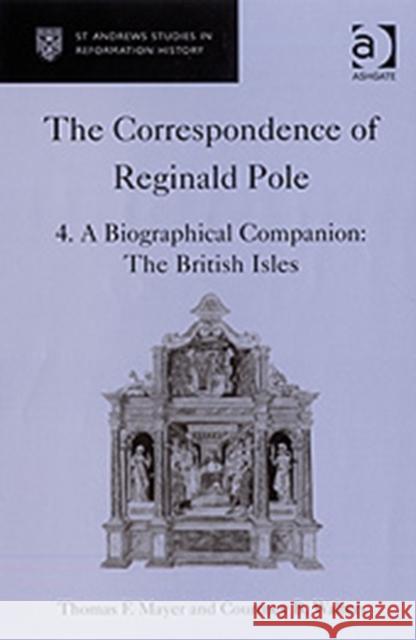The Correspondence of Reginald Pole: Volume 4 a Biographical Companion: The British Isles » książka
The Correspondence of Reginald Pole: Volume 4 a Biographical Companion: The British Isles
ISBN-13: 9780754603290 / Angielski / Twarda / 2008
Reginald Pole (1500-1558), cardinal and archbishop of Canterbury, was at the centre of reform controversies in the mid 16th century - antagonist of Henry VIII, a leader of the reform group in the Roman Church, and nearly elected pope (Julius III was elected in his stead). His voluminous correspondence - more than 2500 items, including letters to him - forms a major source for historians not only of England, but of Catholic Europe and the early Reformation as a whole. In addition to the insight they provide on political history, both secular and ecclesiastical, and on the spiritual motives of reform, they also constitute a great resource for our understanding of humanist learning and cultural patronage in the Renaissance.Hitherto there has been no comprehensive, let alone modern or accurate listing and analysis of this correspondence, in large part due to the complexity of the manuscript traditions and the difficulties of legibility. The present work makes this vast body of material accessible to the researcher, summarising each letter (and printing key texts usually in critical editions), together with necessary identification and comment. The first three volumes in this set contain the correspondence; the fourth and fifth provide a biographical companion to all persons mentioned, and together constitute a major research tool in their own right.The entries in these last two volumes identify all the persons mentioned in any significant way in the previous three volumes of correspondence. Much of the material is archival and new, and focussing on less well-known figures will provide opportunities for further research. The introduction to the present volume emphasizes Pole's role in the reconstruction of the Marian church in England. It analyses the clergy who approached him, addressing questions of what kind of men did so, what they hoped to gain thereby, and the implications of this for a successful restoration of a Catholic establishment. Their educational, literary, and religious activities are considered, as also questions of patronage with discussion of the degree to which a committed group of laity contributed to restoring the old order, while simultaneously hampering it in economic terms, by refusing to make any substantial restitution of ex-monastic property.











